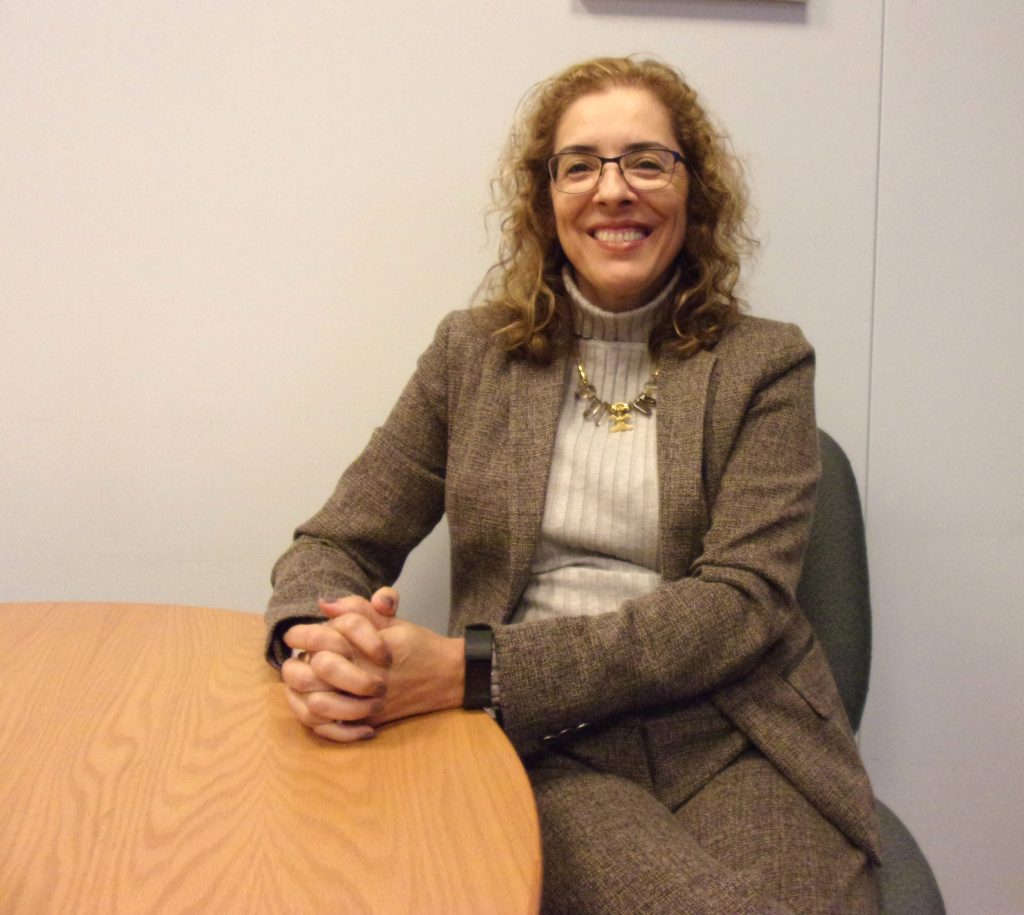After several years of working with international organizations and shuttling between Costa Rica and the United States, Lilleana Cavanaugh, the Executive Director of the Ohio Latino Affairs Commission decided to relocate to the United States. She completed her education and when she was given the opportunity to work with the Latino Affairs Commission, an excited Lilleana saw it as an opportunity to make an impact. The Ohio Commission on Hispanic/Latino Affairs was created in 1977 with seventeen mandates proscribed in sections 121.32 and 121.33 of the Ohio Revised Code. She spoke with Deba Uwadiae, Editor-In-Chief, New Americans magazine on her sojourn in the Commission in the past 11 years.
Opportunity
When I was given the opportunity to work with the Latino Affairs Commission, I was very excited because I realized that it was really important personally for me to try to somehow impact the people that were in charge of government at the policy level. I knew that our community lacked representation and it was important for me to learn how we could best help our community in all different levels and how we were perceived.
I have been working with the Latino Affairs Commission for almost 11years now. About nine of those years, I have been the executive director.
The focus of my work was always in the US. It was a natural match to come here.
Commission
I got interested in the Commission because I was doing a lot of volunteering in different Latino organizations in my community. I realized that as much as these organizations are trying to improve the quality of life of our people, there were so many barriers that were structural barriers. I thought that these changes have to come from government, from policy perspective.
I noticed also that there were a lot of gaps in communication and understanding from our elected officials and government officials in regards to who truly are the Latinos; what our needs are and what our contributions are. I was full of curiosity to figure out how you go to the higher ups to try to express our needs and our point of view. That was when I first learned about the Latino Affairs Commission. Eventually there was an opening here, that was how I came and I became part of the commission.
The Commission was founded on the basic purpose to create a bridge of communication between the Hispanic community and State government. When it was founded they realized that it was important to have representation. So they created three basic mandates for our commission. We have been around for more than 40years. We are here to advice the governor and the legislators on issues impacting Hispanic Latinos; to build capacity in leadership among Latinos and Latinos’ serving organizations; and to connect the Latinos and Latinos’ serving groups.
In a way, we are the State entity that connects Hispanics to the government but at the same time we also work with the community to learn how to function in America; how to function in the mainstream; what are the rights and responsibilities as a citizen who is living in the midst of the society because a lot of our people come from countries where government is not to be trusted or they have issues with the police or politicians. It is very hard for them to come here and to think and to know that it is different.
The Commission does a good job in engaging the community and trying to understand their needs and wants and most importantly empowering them and helping them stay on their feet and represent their own interest.
Funding
The Commission is funded from the general revenue fund and so our funding comes from the state government money. We are also authorized to receive managed grant.
Population
The Commission represents the entire Hispanic community in the State of Ohio and there are about 400,000 Latinos in the State. The majority of Latinos in the State of Ohio have been here for a very long time. Majority of the Latinos are citizens or residents or they have legal status. That is something that we need to emphasize even though the narrative in the mainstream media. We are a population that has been part of Ohio for a very long time. In fact since the 1900s Latinos have been coming to the north-west part of the State and have been part of the population in the harvest of our agricultural products.
We have a strong community and we will continue to grow. Nationally and in the State of Ohio we are the fastest growing demographic. That is something very important.
Board
Our Commission is governed by a Board of Commissioners. We have a space for 11 commissioners, right now they are 10. These are people with Hispanic heritage representing different regions of the state where there are Latinos. Our office is not working in a vacuum, but we have representations locally and all the different regions. We communicate back and forth with our commissioners. We are closer to where most of the people are. Even though we have a small team in the office we definitely make a big effort in trying to stay in regular contact with the people in all the different communities across the State because we cannot exist in a bubble. Our work is not just representing the Latinos of central Ohio; we have many different communities throughout the State with very different history and needs. So we attempt to at the very least to be knowledgeable about what those different trends are and to be able to connect the different people that can do something to improve the quality of life.
Contributions
We have over 16,000 Latino businesses that are bringing billions of dollars into our economy. When you consider the workforce the median age of Hispanic is 24 to 26years old. These are young professionals on a daily basis becoming part of main stream society and contributing. Just by the mere fact that in 87 out of the 88 counties in the State, population growth is marked by the growth of the Hispanic community so there is definitely an impact economically, socially and in every level of society. The economic contributions are important but more important than just the economic factor is the influence that we are having as we are building the fabric of the state. That is something that is recognizable all around Ohio. We have people in all different levels of responsibilities but may be not as many representing us in the highest political environment of the State. However, we do have two state representatives of Hispanic heritage that serve in the general assembly. We have about 17 Latinos elected officials that are serving across the board from School boards to City and county positions. Little by little we are trying to notch the number of Latinos that are taking steps forward playing a role in public service.
Relationship
Overall, I feel very confident that we have established a really good line of communication with the leadership of the Latino community and with a lot of Latino serving and supporting organizations to the point that I can say that they know we are here to support them. One thing that is really important in our work is that we are here to empower people to step up in their civic duties and take their role in the society. We are not here to do for them; we are here to support them and to enhance their abilities to do for themselves. That is something that is very important in our work. For example, whenever we carry out any of our major initiative we always make sure we include the voice of the people through our communities, we ask advisers, people that represent those particular needs in the community to be a part of our planning group. We make sure that we connect with some sort of participating from the local communities, whether through universities, companies, hospitals, or established entities in the community. We want to try to engage them because when they have some investment then you create something sustainable.
“We don’t only come here to realize the Americans dream but with that we have the opportunity to have a voice and that voice matters and we can’t afford to waste it. “
Definitely, our commissioners play an important role in being that group that helps to bring together the interest of the community and the representation of that community in everything that we do. We have been able to create a model where we don’t see the community as those being served but we see them as our partners in creating equity. It will be too easy to focus on all the things that are inequalities and all the things that are not going well. We know that change of this sort of empowerment and development takes many years to happen but we focus on changing one life at a time and we focus on creating some kind of synergy and collaboration. This is not only within the Latino community but with our other partners because we know we don’t live in a bubble. We know we have refugees; we have new immigrants, the African communities, the Asian communities and so many more that are part of the pilgrimage we are going through. We realize that collaboration is really important to empower all of our communities to create a change that is more sustainable. I feel we are continuously building this relationships and we aim very high at always being engaged and a very good listener to whatever priorities and the needs of the community.
The fact that we are present in many important conversations changes the dynamic around the table. We provide different perspective; we try to engage our people to come to have the opportunity of a face-to-face conversation with those decision makers. Those in decision making position of authority make choices based on the knowledge that they have. If we haven’t reached to them to try to help them understand this other perspective then why are we going to hold them accountable for bad decision? Something that is important to us is to constantly educate about how import their voice and opportunity that is a given right in this country to speak to the elected officials and to provide to them our point of view. They really appreciate it. They may not agree with everything but from what we do in the circle of government it is deeply appreciated.
Programs
Our Commission has key strategic initiatives in the area of education, health, workforce and economic development and diversity inclusion. These are our four pillars that dictate our major areas of interest.
Every year we hold a Latino Education Summit where we concentrate on sharing best practices that are going to empower, not only the educators, but people who are working in government, community leaders and advocates, students and youths, people that are interested in education to understand what are the things that are going well and working well with the Latino community. When we do our summit at our main event, we don’t come together to highlight what is not working, we already know that. Our challenges are how do we present best practices, collaborations, ideas, models and pilot projects that can shed some lights on how these can be improved and what steps can be made to decrease these inequalities and to bring us closer to equity and better quality of life. We also host a Latino Health Summit and Legislative visit day.
DACA
DACA is a federal issue. It doesn’t matter what I think, it is not going to be decided at the state level. Is it something that is impacting tons of people, it is? Because of our work, and the scope of the commission, it is beyond our responsibility and ability to directly make a recommendation as regards it. It is our duty as citizens to convey our feelings to elected senators, congress men and women in Washington to make our voices heard. We hear on regular basis, stories that break the heart, how people are being impacted by DACA.
Forward
Looking forward, for us as Hispanics in Ohio and all new Americans it is very critical that we take advantage of the opportunities that we have in this country that we register to vote and we vote. We have fought too hard and we have struggled too hard to be here. We don’t only come here to realize the American dream but with that we have the opportunity to have a voice and that voice matters and we can’t afford to waste it. It is very important that we need to make sure that our voice gets heard. The best way to register our voice is by voting and becoming involved. This is different than whatever you might have left behind and truly the voice matters.
































Leave a Reply
You must be logged in to post a comment.